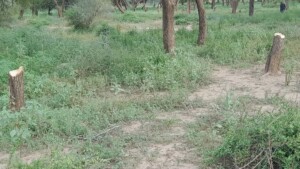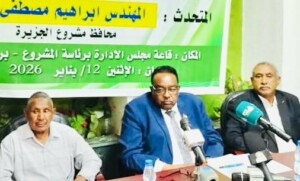Cooking gas shortage forces prices up in Sudanese capital
The cooking gas crisis, which began in Khartoum two weeks ago, continues to worsen. Gas stores in many neighbourhoods in Khartoum, Omdurman, and Khartoum North (Bahri), have closed their doors or are selling a limited amount of gas a day, amid resentment and anger among the population.
 Liquefied petroleum gas cylinders being sold in Nyala, South Darfur (File photo: Albert González Farran / UNAMID)
Liquefied petroleum gas cylinders being sold in Nyala, South Darfur (File photo: Albert González Farran / UNAMID)
The cooking gas crisis, which began in Khartoum two weeks ago, continues to worsen. Gas stores in many neighbourhoods in Khartoum, Omdurman, and Khartoum North (Bahri), have closed their doors or are selling a limited amount of gas a day, amid resentment and anger among the population.
In the capital, people are once again waiting in long lines for cooking gas, the Sudanese online news outlet Medameek reported on Monday.
Fatima Hasan, who was part of a queue, said that gas prices have multiplied in the last few weeks. She complained that “the prices differ from one shop to another, due to a lack of price controls.”
“The costs for a liquefied petroleum gas (LPG) cylinder exceeds SDG3,000* in some neighbourhoods, and we are forced to buy it” in order to cook food, she said.
Gas store owners explained to Medameek that the supply of LPG cylinders suddenly halted over two weeks ago. Some shops have received limited quantities of 50 LPG cylinders since then, which is a very small percentage compared to the amount of demand, they said.
Some of them attributed the scarcity of cooking gas to the suspension of the operations at the refinery of Khartoum at the end of last month, following the sabotage of the oil pipeline that runs from West Kordofan to Khartoum last month.
The Oil Workers Association at the time warned about the dire consequences of gradually halting work at the Khartoum refinery, predicting a crisis in the supply of fuel and gas.
However, the Ministry of Energy and Oil stated that the refinery resumed its work after the pipeline was repaired and claimed that there is stock available.
According to the Oil Workers Association, the Nile Blend crude oil stock was not sufficient to avoid the refinery stopping its work at the time. After the sabotage, the stock decreased below the minimum level required for the refinery to continue operating, they said.
Conflict and tension surrounding the oil industry in Kordofan had been a bone of contention for many years. On October 6, Misseriya youth protesters involved in a border dispute with the Hamar tribe stormed the Um Adara oil field in West Kordofan, forcing the station to halt its activities and detaining the oil workers. The oil pipeline transporting oil from the station has also been closed down, which might cause severe technical issues and permanent damage.
* SDG3,000 equals five US Dollar.











 and then
and then